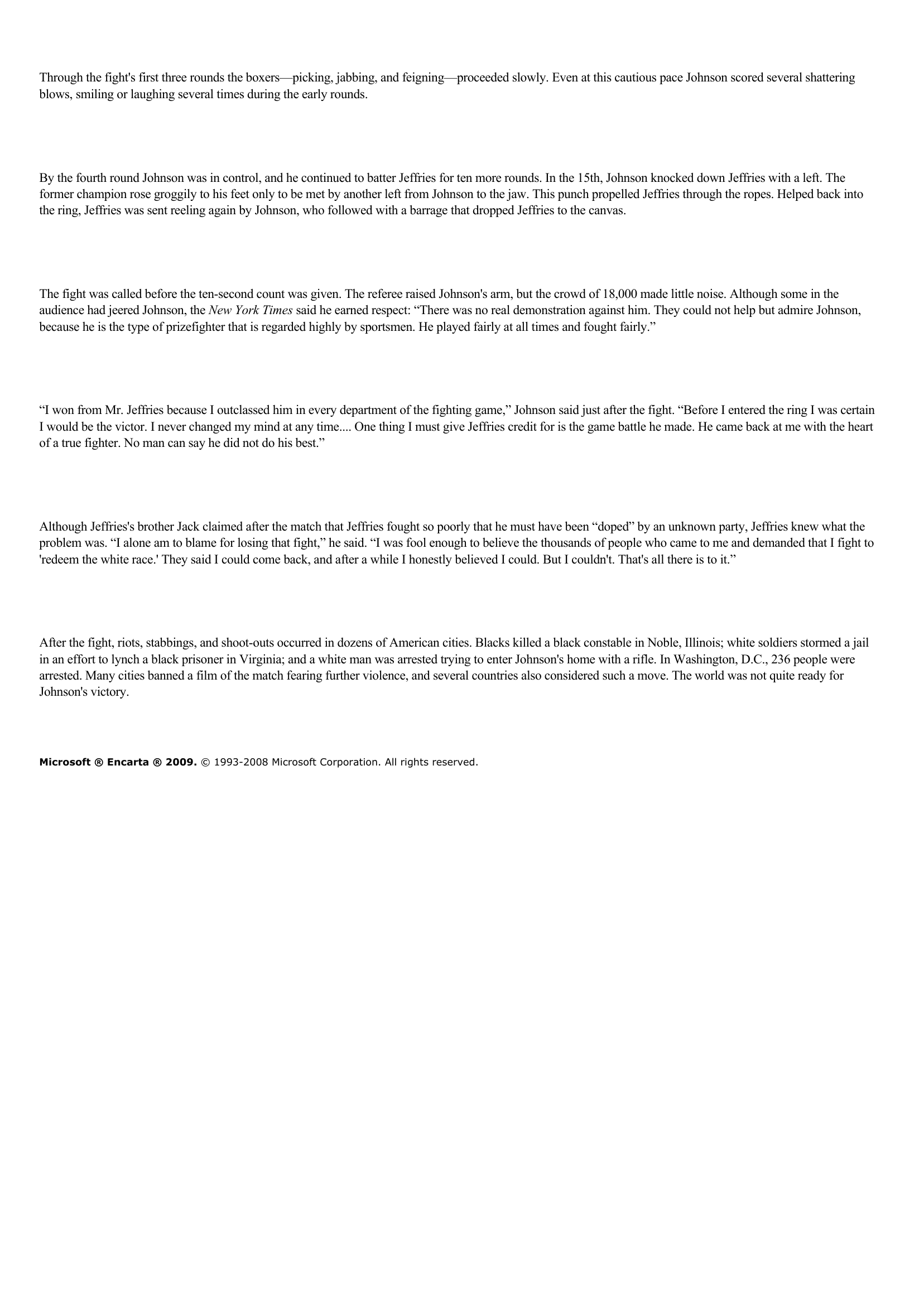Johnson Knocks Out Jeffries.
Publié le 14/05/2013

Extrait du document
«
Through the fight's first three rounds the boxers—picking, jabbing, and feigning—proceeded slowly.
Even at this cautious pace Johnson scored several shatteringblows, smiling or laughing several times during the early rounds.
By the fourth round Johnson was in control, and he continued to batter Jeffries for ten more rounds.
In the 15th, Johnson knocked down Jeffries with a left.
Theformer champion rose groggily to his feet only to be met by another left from Johnson to the jaw.
This punch propelled Jeffries through the ropes.
Helped back intothe ring, Jeffries was sent reeling again by Johnson, who followed with a barrage that dropped Jeffries to the canvas.
The fight was called before the ten-second count was given.
The referee raised Johnson's arm, but the crowd of 18,000 made little noise.
Although some in theaudience had jeered Johnson, the New York Times said he earned respect: “There was no real demonstration against him.
They could not help but admire Johnson, because he is the type of prizefighter that is regarded highly by sportsmen.
He played fairly at all times and fought fairly.”
“I won from Mr.
Jeffries because I outclassed him in every department of the fighting game,” Johnson said just after the fight.
“Before I entered the ring I was certainI would be the victor.
I never changed my mind at any time....
One thing I must give Jeffries credit for is the game battle he made.
He came back at me with the heartof a true fighter.
No man can say he did not do his best.”
Although Jeffries's brother Jack claimed after the match that Jeffries fought so poorly that he must have been “doped” by an unknown party, Jeffries knew what theproblem was.
“I alone am to blame for losing that fight,” he said.
“I was fool enough to believe the thousands of people who came to me and demanded that I fight to'redeem the white race.' They said I could come back, and after a while I honestly believed I could.
But I couldn't.
That's all there is to it.”
After the fight, riots, stabbings, and shoot-outs occurred in dozens of American cities.
Blacks killed a black constable in Noble, Illinois; white soldiers stormed a jailin an effort to lynch a black prisoner in Virginia; and a white man was arrested trying to enter Johnson's home with a rifle.
In Washington, D.C., 236 people werearrested.
Many cities banned a film of the match fearing further violence, and several countries also considered such a move.
The world was not quite ready forJohnson's victory.
Microsoft ® Encarta ® 2009. © 1993-2008 Microsoft Corporation.
All rights reserved..
»
↓↓↓ APERÇU DU DOCUMENT ↓↓↓
Liens utiles
- affaire boris johnson
- LETTRE RECOMMANDÉE (résumé) Eyvind Johnson
- FERME AFRICAINE (La) [Out of Africa]. (résumé) Karen Blixen
- VIE DE SAMUEL JOHNSON [The Life of Samuel Johnson]. (résumé & analyse de l’oeuvre)
- MISSIÉ JOHNSON (résumé) Joyce Cary




